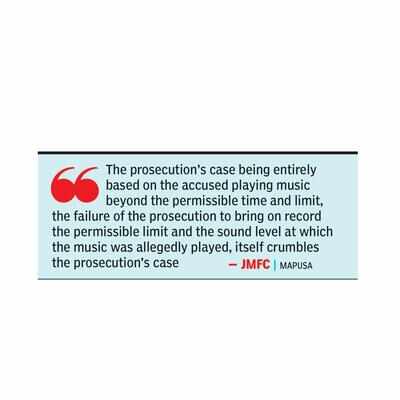Top Searches
Not measuring decibel levels leads to acquittal in 2013 case

Panaji: A criminal case of noise pollution at a party at Assagao dating back to December 5, 2013, has come to naught after the prosecution failed to measure the sound played at the party and failed to record statements of any of the witnesses present.
The court acquitted Jackie Paul, a native of Himachal Pradesh.
“It is a settled principle of law that in order to ascertain whether or not the sound of the music was beyond the permissible limits, it was necessary for the police to measure the sound. In the absence of the sound being measured, this court will not be in a position to ascertain the degree of the sound,” stated Teisy Mascarenhas, Judicial Magistrate First Class, at ‘F’ Court, Mapusa.
The court also noted that neither the investigating officer nor the raiding officer recorded the statements of any of the persons at the party despite the prosecution witnesses stating that there were 50-60 people present at the spot. This, it stated, affects the case of the prosecution.
“In the present case, the prosecution has not examined any independent witnesses in support of its case so as to substantiate that music was played beyond permissible limits by the accused on the relevant date and time,” the court held.
It observed that although the prosecution examined the owner of the club and he deposed that he obtained permissions on behalf of the accused, the prosecution did not produce any documents or permissions, if any, issued in favour of the club so as to bring to light the terms and conditions subject to which permissions were granted.
The court stated that since section 15 of the Environment (Protection Act), 1986, prescribes punishment for contravening any provisions under the Act, it was for the prosecution to point out the rules or directions that the accused allegedly contravened.
“There is no material whatsoever before this court that shows which of the directions or rules were contravened by the accused,” the court stated. “Thus, there are several loopholes in the prosecution’s case which raise serious doubts about the genuineness of the case and, as such, the accused ought to be given the benefit of doubt,” the court held.
The court acquitted Jackie Paul, a native of Himachal Pradesh.
“It is a settled principle of law that in order to ascertain whether or not the sound of the music was beyond the permissible limits, it was necessary for the police to measure the sound. In the absence of the sound being measured, this court will not be in a position to ascertain the degree of the sound,” stated Teisy Mascarenhas, Judicial Magistrate First Class, at ‘F’ Court, Mapusa.
The court also noted that neither the investigating officer nor the raiding officer recorded the statements of any of the persons at the party despite the prosecution witnesses stating that there were 50-60 people present at the spot. This, it stated, affects the case of the prosecution.
“In the present case, the prosecution has not examined any independent witnesses in support of its case so as to substantiate that music was played beyond permissible limits by the accused on the relevant date and time,” the court held.
It observed that although the prosecution examined the owner of the club and he deposed that he obtained permissions on behalf of the accused, the prosecution did not produce any documents or permissions, if any, issued in favour of the club so as to bring to light the terms and conditions subject to which permissions were granted.
The court stated that since section 15 of the Environment (Protection Act), 1986, prescribes punishment for contravening any provisions under the Act, it was for the prosecution to point out the rules or directions that the accused allegedly contravened.
“There is no material whatsoever before this court that shows which of the directions or rules were contravened by the accused,” the court stated. “Thus, there are several loopholes in the prosecution’s case which raise serious doubts about the genuineness of the case and, as such, the accused ought to be given the benefit of doubt,” the court held.
FOLLOW US ON SOCIAL MEDIA
FacebookTwitterInstagramKOO APPYOUTUBE
Start a Conversation
end of article









